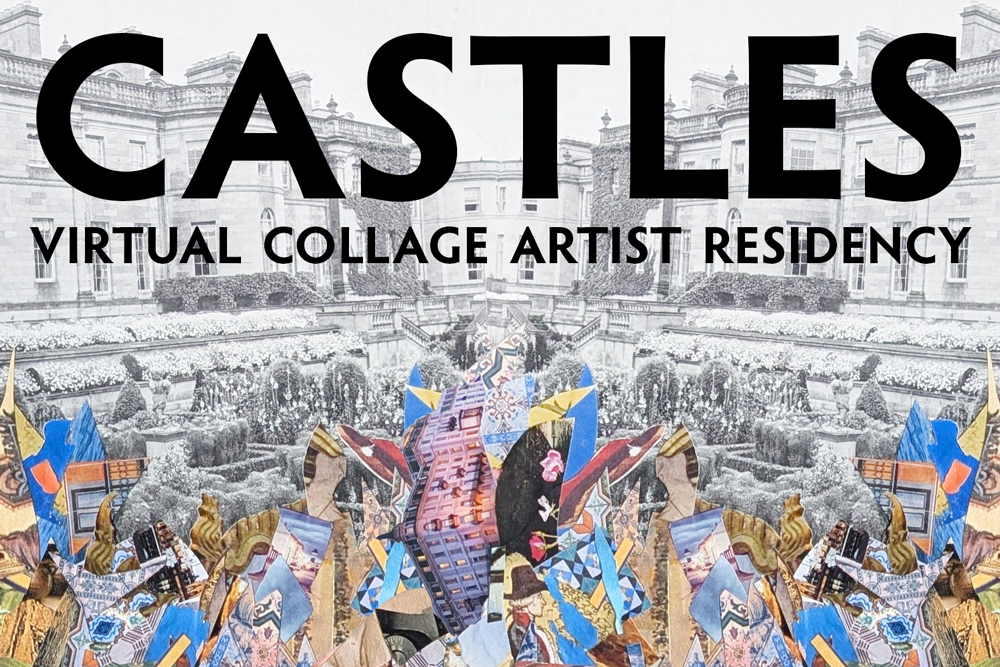
COLLAGE RESIDENCY
Castles as Buildings, Metaphors and Systems of Power Virtual Artist Residency
A month-long, virtual/online collage artist residency in November and December 2024
As part of a year-long investigation of castles as buildings, metaphors, and systems of power, Kolaj Institute hosted a month-long virtual artist residency focused on castles and the space they occupy in our contemporary imagination. The residency built on the work done by artists in Collage Artist Residency: Scotland and New Orleans where artists explored feudal castle systems, manor houses, and plantations as buildings, metaphors, and systems of power.
The idea of castles dates back to the medieval period. Conventionally defined as fortified homes for seats of power, over time the idea of castles has evolved dramatically. Rich in mythology and folklore, castles appear in the 20th and 21st century as palatial estates renowned for their aristocracy and romance, centers of theme parks of the imagination. The idea that a “man’s house is his castle” is one of the oldest principles in Anglo-American jurisprudence. The reality of castles is much more complex: Not homes, but villages where complex systems of power dictated rules and etiquette. As models of human organization, castle-like systems can be found in early colonial Americas and plantation culture where the romance of Lord of the Manor and Master of the House falls quickly against the realities of slavery, patriarchy, and class division. In 21st century late-stage capitalism, we see the castle system reproduced in the C-Suites of the corporate class.
In this virtual residency, we examined 20th century romantic notions of castles in popular media and theme parks. Artists will make artwork that expresses ideas that connect history and folklore to contemporary manifestations of power.
Artists will learn how to develop contemporary art projects and adapt their artist practice to pick up the unfinished work of history and make art that contributes to the civic discourse. Through interactive sessions, artists will explore their process and practice; present a slideshow of their work; receive supportive, critical, curatorial feedback about their ideas; and discuss contemporary issues. The residency will speak to issues of appropriation, copyright, and fair use and explore how the artist’s choice and understanding of material shapes the narrative of the artwork. Additional topics will include understanding one’s own artist practice and using history in one’s work; collage in theory; what contemporary means and how contemporary art projects operate in the ecosystem of art; how to build context for one’s artwork; and making exhibition proposals. Artists will complete the residency with a new perspective on their art practice.
After the Residency, artists will be invited to propose artwork for inclusion in Kolaj Institute’s Castle Project, an exhibition, book, and related programs in 2025-2026 that invite viewers to consider how the history of castles, colonies, plantations, and corporations relate to one another and shape the world we live in today.
PARTICIPATING ARTISTS
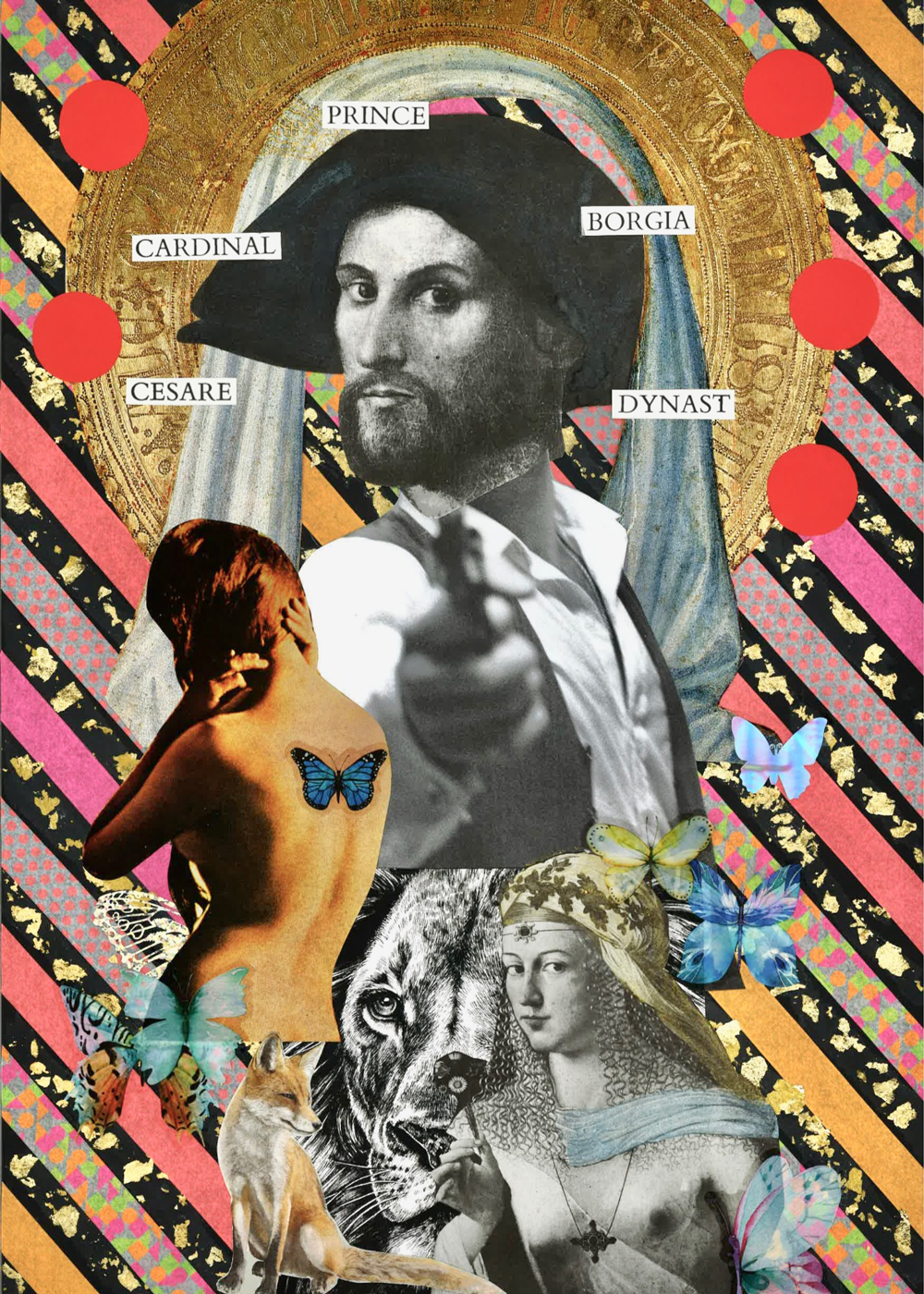
16.5″x11.7″; paper from magazine and history books, paint, glitter; 2023. Courtesy of the artist.
Yujia Jin
Yujia Flavia Jin is a synesthesia collage artist and literature scholar currently living in Glasgow, Scotland, originally from Beijing, China. She holds an MA in Literary and Compartive Studies from Hong Kong Baptist University and a BA in Italian Language and Culture from Beijing International Studies University. She is currently a PhD candidate in Comparative Literature at the University of Glasgow. Her interdisciplinary research examines how Renaissance families are portrayed in television and video games, viewing these media as sites where history is consumed and reinterpreted through a modern lens. Her artistic practice brings these ideas into the visual realm, using collage to explore how historical narratives are fragmented and reconstructed in modern storytelling. Her series “Heteroglossic Renaissance” (2023) was funded and exhibited by the Scottish Graduate School of Arts and Humanities Heteroglossia (2023) was exhibited at the University of Glasgow’s Advanced Research Centre.

6″x6″; mixed media drawings, Polaroid; 2024. Courtesy of the artist.
Amaris Feland Ketcham
Amaris Feland Ketcham is a writer and multidisciplinary artist. She teaches with the University of New Mexico Honors College, where she is the faculty advisor for the nationally acclaimed arts and literature magazine Scribendi. She has written two poetry books, A Poetic Inventory of the Sandia Mountains and Glitches in the FBI; a camping guide to New Mexico, Best Tent Camping: New Mexico; and a graphic novel, Unfiltered: A Cancer Year Diary. Her project “Poetic Routes”, an interactive poetic cartography of Albuquerque, has been adopted by the Albuquerque City Planning Department, as a way to use poetry as a means of understanding neighborhoods and community character throughout town.
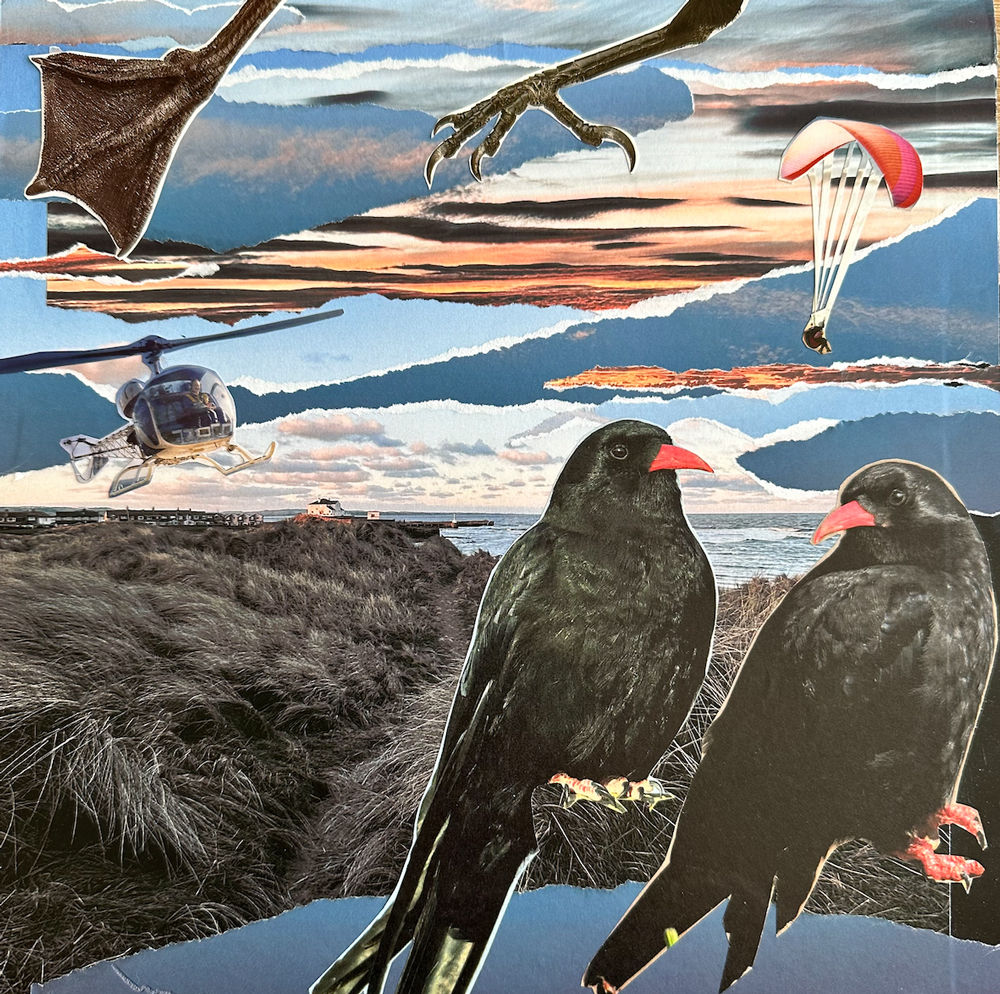
12″x12″; collage on black MDF cake base; 2024. Courtesy of the artist.
Cathy Greenhalgh
Cathy Greenhalgh is a collage artist, film-maker and writer living in Amble, Northumberland, United Kingdom, relocating in 2024 after forty-five years in London. She has worked most of her professional life as a film-maker (director-cinematographer), lecturer and manager in higher education. Her films have been shown in numerous film festivals. She publishes academic writing on cinematographic aesthetics and phenomena and ethnographic work on film-making practices. In the last five years her work encompasses primarily collage (mainly analogue, handmade) and poetry, including Covid Collage Chronicles a four-hundred piece work exhibited at Royal Anthropological Institute Film Festival in 2021. A forthcoming chapter on this work (due 2025) is being published by Sean Kingston Publishing in an anthropology anthology on creativity during the pandemic. Greenhalgh participated in Kolaj Institute’s 2022 Politics in Collage Residency; the Poetry & Collage Residency; and the Curating Collage Workshop and her work has been published in Politics & Collage (2022) and PoetryXCollage, Volumes 1 and 2. She has undertaken several courses with poets through The Poetry School in London, specializing in collage methods.
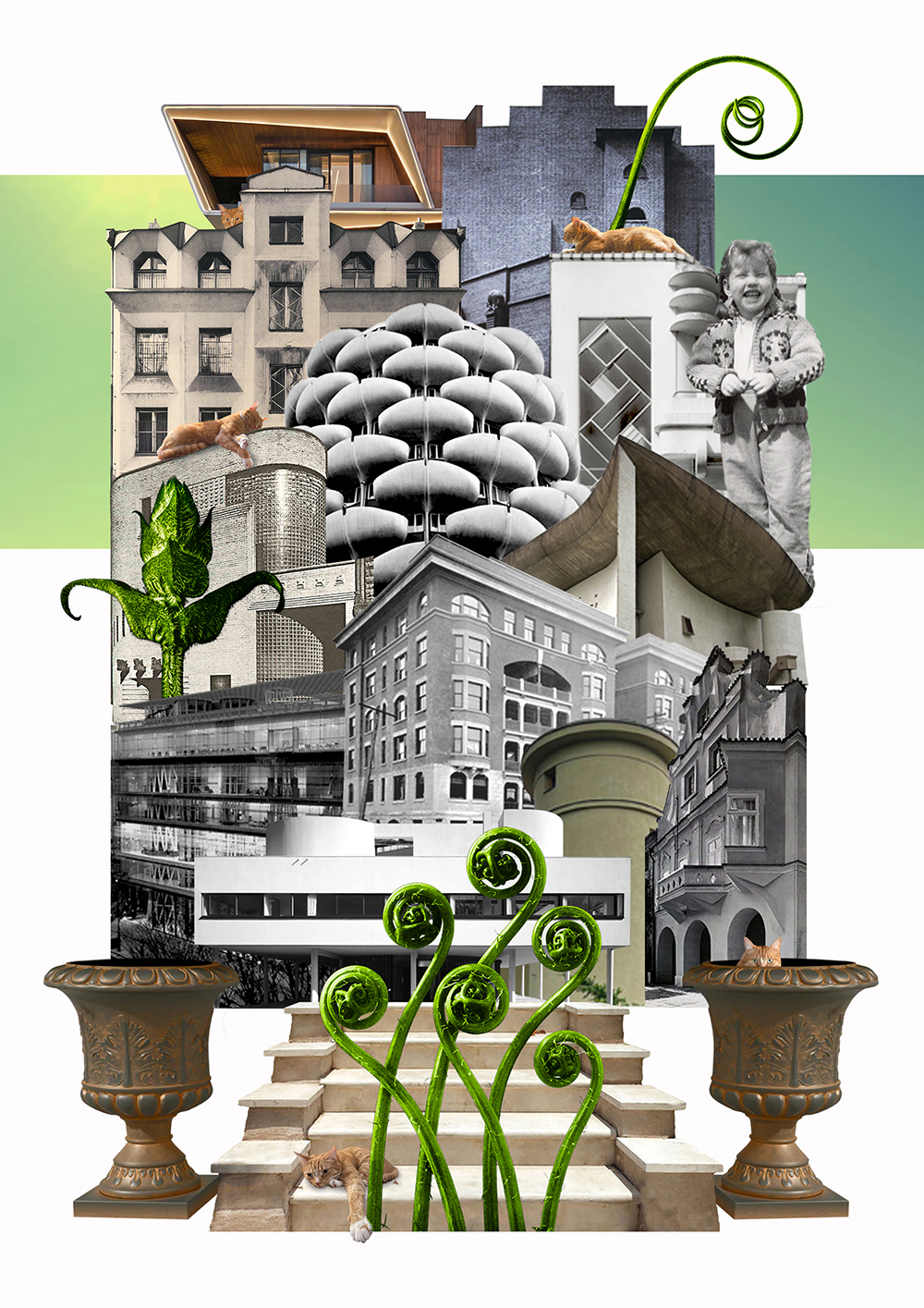
11″x8″; digital collage made with analog materials; 2023. Courtesy of the artist.
Ginger Sedlarova
Ginger Sedlarova is a Canadian collage artist and visual storyteller with a background in journalism and design and a decade of experience living among castles in Prague, Czech Republic. Her collages have been exhibited in Canada, the US and Europe. Additionally, her work has been published Kolaj 34 and the World Collage Day 2022 Special Edition and books including Melanie Mowinski’s Collage Your Life and Kolaj Institute’s Politics in Collage and Artists in the Archives. She has participated in artist residencies including Kolaj Institute’s 2022 Artists in the Archives and the 2024 Berlinage, both of which deepened her desire to work within historical contexts. Currently, Sedlarova has two upcoming solo exhibitions of her in-progress series “Heirloom”, which explores the stories of her Jewish ancestors.
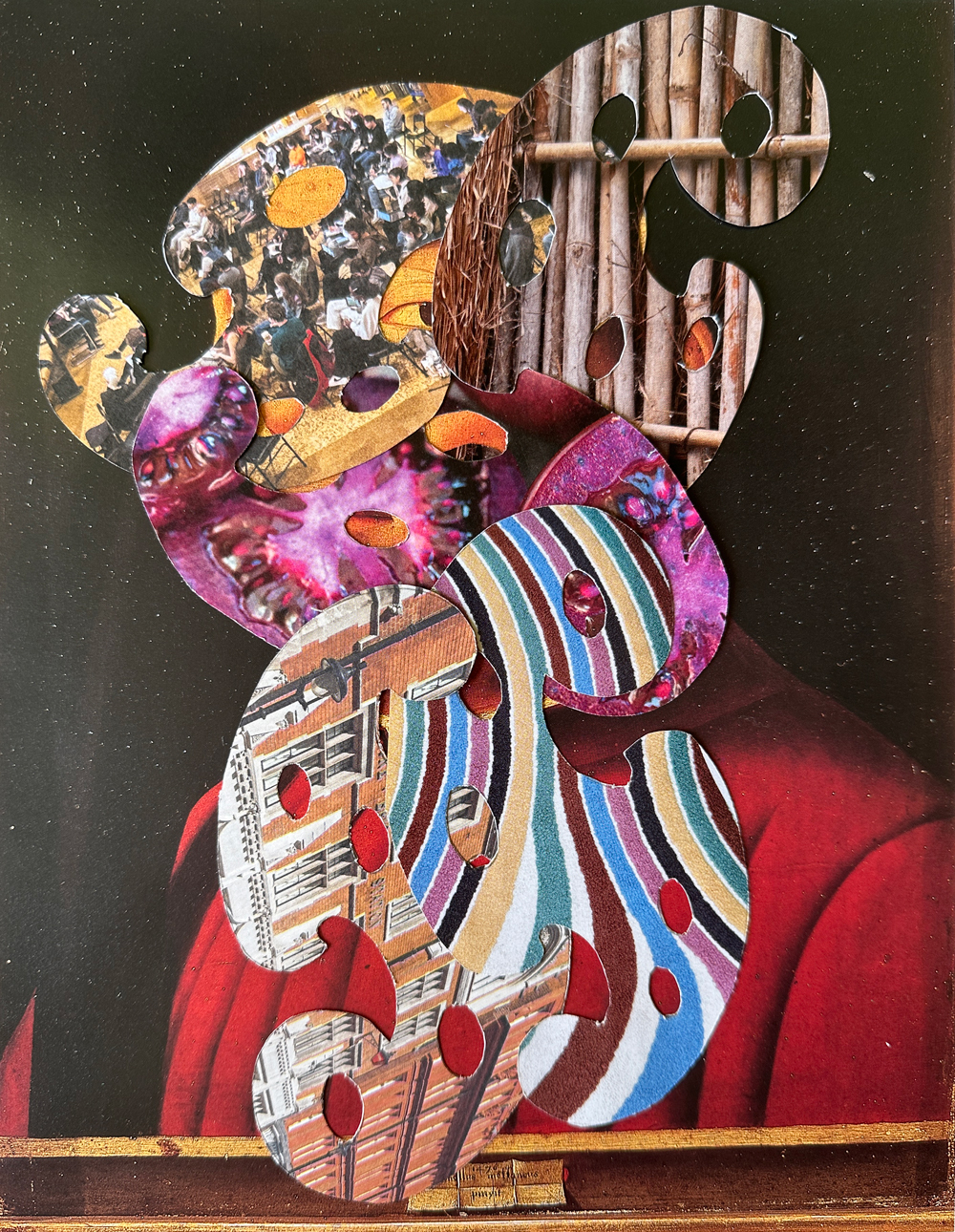
12″x9″; collage on paper; 2024. Courtesy of the artist.
Helen Kauder
Helen Kauder’s collage practice began in mid-2021, following a 25-year career in arts administration. Kauder holds a BS in Economics from the Massachusetts Institute of Technology and an MBA in Finance & Accounting from the University of Chicago. Her work has been exhibited at venues in Connecticut and New York. Her work, Antonello Past, Present, and Future, was selected by Aaron Beebe for the January 2025 issue of Cut Me Up Magazine, Issue 14.
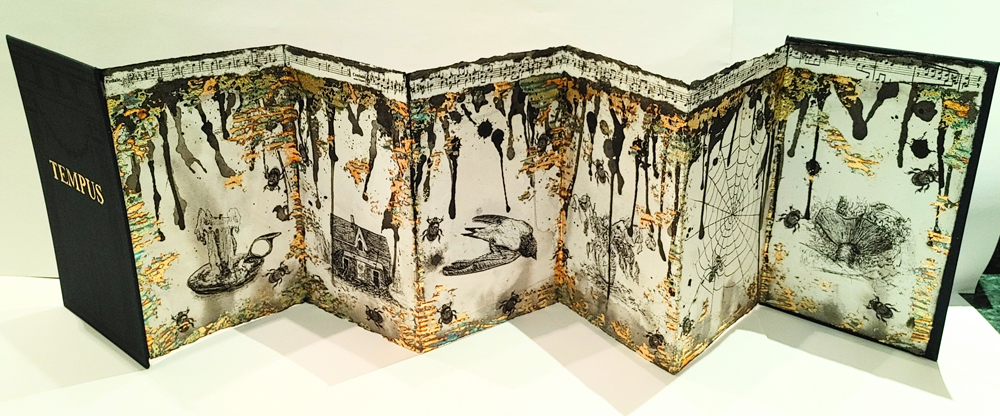
6″x20″x4″ (when open); pen, ink, watercolour, xylene transfer and gold leaf on paper, linen on book board; 2023. Courtesy of the artist.
Nathan Davis
Nathan Davis is an emerging artist. He is is currently completing his final year of the BFA in Visual Arts program at the University of the Fraser Valley, in which his academic achievements continue to earn him a Dean’s list standing. His work has been shown across the Lower Mainland, including the University of the Fraser Valley at the Mission Arts Counsel, a juried exhibition for which he was awarded Best in Show in 2023 and 2024. One of his pieces is currently on display at the University of British Columbia as part of “Connecting the Dots: Student Printmaking Exhibition”. The artist lives and works in Maple Ridge, British Columbia, on the unceded traditional territory of the Stó:lō people.
ABOUT THE FACULTY
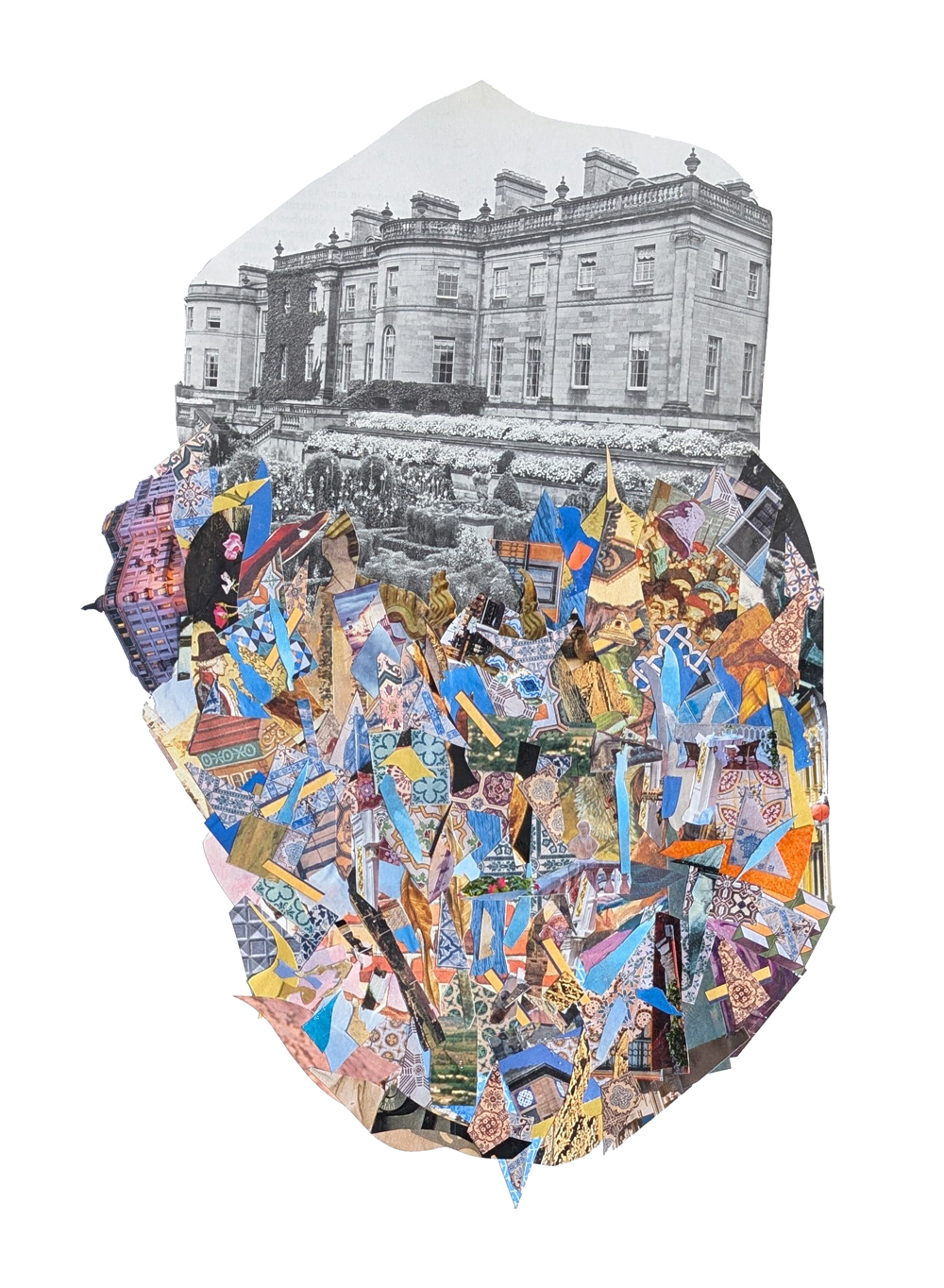
15″x11″; collage of book image and materials left behind by artists in residence on cardstock; 2024. Courtesy of the artist.
Ric Kasini Kadour, a 2021 Andy Warhol Foundation for the Visual Arts Curatorial Fellow, is a writer, artist, publisher, and cultural worker. Working with the Vermont Arts Council, Kadour curated four exhibits: “Connection: The Art of Coming Together” (2017) and Vermont Artists to Watch 2018, 2019 and 2020. In 2017, he curated “The Art of Winter” at S.P.A.C.E. Gallery in Burlington, Vermont. In 2018, Kadour curated “Revolutionary Paths: Critical Issues in Collage” at Antenna Gallery in New Orleans, which bought together collage artists whose work represents the potential for deeper inquiry and further curatorial exploration of the medium; followed in 2019 by “Cultural Deconstructions: Critical Issues in Collage” at LeMieux Galleries in New Orleans, which furthered the conversation; and “Amuse Bouche”, also at LeMieux Galleries in 2023. Since 2018, he has produced Kolaj Fest New Orleans, a multi-day festival & symposium about contemporary collage and its role in art, culture, and society. As Curator of Contemporary Art at Rokeby Museum in Ferrisburgh, Vermont in 2019 and 2020, he curated three exhibitions, “Rokeby Through the Lens” (May 19-June 16, 2019), “Structures” (August 24-October 27, 2019), and “Mending Fences: New Works by Carol MacDonald” (July 12-October 25, 2020). He also curated “Contemporary American Regionalism: Vermont Perspectives” (August 17-October 20, 2019); “Where the Sun Casts No Shadow: Postcards from the Creative Crossroads of Quito, Ecuador” (November 1-30, 2019); and “Many Americas” (August 20-November 27, 2022) in the Wilson Museum & Galleries at the Southern Vermont Arts Center. “The Money $how”, co-curated with Frank Juarez, was presented at the AIR Space Gallery at Saint Kate-The Arts Hotel in Milwaukee, Wisconsin (April 10-September 12, 2021). For Birr Vintage Week & Arts Festival in Birr, County Offaly, Ireland (August 13-20, 2021), he curated “Empty Columns Are a Place to Dream”, which traveled to the Knoxville Museum of Art in January-February 2022. At 516 ARTS in Albuquerque, New Mexico, Kadour co-curated with Alicia Inez Guzmàn two exhibitions: “Many Worlds Are Born” (February 19-May 14, 2022) and “Technologies of the Spirit” (June 11-September 3, 2022). In 2023 at the Knoxville Museum of Art, Kadour curated “Where the Sun Casts No Shadow: Postcards from the Creative Crossroads of Quito, Ecuador” (January 9-February 16, 2023) and “Mythical Landscape: Secrets of the Vale” (March 17-May 28, 2023). In September 2023, he curated “Word of Mouth: Folklore, Community and Collage” at A’ the Airts in Sanquhar, Scotland. At Kolaj Institute Gallery, he curated “Grand Opening Exhibition” (March 9-April 14, 2024), “Collage the Planet: Environmentalism in Art” (April 19-May 26, 2024), “Magic in the Modern World” (June 1-August 11, 2024), “Advanced Wound Healing Techniques: Collage by Robbie Morgan” (August 16-October 6, 2024), and “Temporal Geolocation: How Place & History Inform Identity in Collage” (October 11-November 24, 2024).
His first short film, The Covenant of Schwitters’ Army, debuted at Collage on Screen during Kolaj Fest New Orleans 2023. His second, Joy Is Paper, debuted at Collage on Screen during Kolaj Fest New Orleans 2024. Kadour is the editor and publisher of Kolaj Magazine. He has written for a number of galleries and his writing has appeared in Hyperallergic, OEI, Vermont Magazine, Seven Days, Seattle Weekly, Art New England (where he was the former Vermont editor) and many others. Kadour maintains an active art practice and his photography, collage, and sculpture have been exhibited in and are part of private collections in Australia, Europe and North America. In January-February 2020, he was artist-in-residence at MERZ Gallery in Sanquhar, Scotland. He holds a BA in Comparative Religion from the University of Vermont. Kadour splits his time between Montreal and New Orleans. www.rickasinikadour.com
